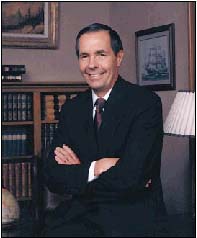The following article is adapted from an address delivered by President Rex E. Lee at the university’s commencement exercises, April 27, 1995.
By Rex E. Lee
In response to what was intended to be a trick question by the Pharisees whether it is “lawful to give tribute to Caesar or not,” Jesus, after eliciting a response that the image and superscription on a penny was Caesar’s, made His universally famous statement, “Render therefore unto Caesar the things which be Caesar’s, and unto God the things which be God’s” (Luke 20:25).
Throughout most of my life, I have regarded this famous statement as an affirmation of the importance of the separation between church and state and the necessity to keep each of them away from matters that are properly the business of the other. In more recent times, though, I have begun to see in it an additional meaning. I now believe that this scripture not only teaches something about the relationship between government and the kingdom of God, but that it also contains two separate, free-standing commandments concerning our obligation of service to be “rendered.” If this is true, then the true follower of Christ recognizes a duty of service not only to deity, but also to government.
I have spoken at other commencement exercises concerning various opportunities for lifetime service to the Church. Today I focus my brief remarks on the other part of what I now believe was, among other things, the Savior’s two-part “rendering” commandment, government service.
Citizen participation is the fuel that keeps the fires of democracy burning. It is also the single characteristic that best distinguishes republican forms of government from autocracies or dictatorships. The latter not only do not depend on participation by the people, they suppress it. And it also follows, I submit, that a creeping indifference among our citizens concerning the importance of their involvement in matters governmental can lead to a deterioration of democracy itself, and of the freedoms it secures.
I hope that many who are graduating today—as well as your fellow alumni—will consider full-time government employment, either in an elective, appointive, or career position. There is a tendency among many people today to regard government service as less respectable than employment in the private sector. This attitude is surely at odds with my own experience. Three different times, I have been employed by the federal government. I found each of these experiences among the most fulfilling and interesting professional responsibilities of my life.
Obviously, I would not expect that all of you would spend part or all of your careers in government service. Our bureaucracy has not yet progressed to the point that it employs every college graduate. But I also hope that you will not consider such service beneath your dignity, or beneath the dignity of your classmates. Employment in the public sector does not pay as well as employment in the private sector, and it carries a further disadvantage because your acts are subject to a much higher degree of public scrutiny and criticism. There are greater opportunities to slip and fall, with consequent damage to your reputation. But these drawbacks are more than offset by the fact that the opportunities to make a real difference—to have your hands on the levers of power and to use those levers for the good of humankind—are much larger.
Now for the great majority who will not spend all or any of your professional lives in government employment, you also have some “rendering” obligations. For it is an undeniable fact that a representative, republican form of government will perform its job better, with better results for all whom it serves, if the citizenry will take the time and make the effort to be informed and then to share their views with those who exercise the powers of government.
This includes responsible criticism directed at specific governmental policies. As recent events should remind us, however, it does not include a generalized, vigilante mindset that regards our elected, representative form of government as the enemy of the people.
In a republican form of government such as ours, the laws—the rules by which we are governed—are made by elected individuals and other persons who are appointed by those individuals. It follows that the best laws result when those who make our laws have the benefit of responsible points of view, expressed by knowledgeable and informed citizens. Our job, then, is to be responsible and informed, and then to express ourselves.
As President Gordon B. Hinckley said in 1975:
The building of public sentiment begins with a few earnest voices. I am not one to advocate shouting defiantly or shaking fists or issuing threats in the face of legislators. But I am one who believes that we should earnestly and sincerely and positively express our conviction to those given the heavy responsibility of making and enforcing our laws. (Conference Report, October 1975, p. 58)
“The best laws result when those who make our laws have the benefit of responsible points of view, expressed by knowledgeable and informed citizens. Our job, then, is to be responsible and informed, and then to express ourselves.”—President Rex E. Lee
The final citizen obligation that I would like to mention today concerns our moral obligation to do our part in financing the operations of government. I am speaking of paying our taxes. I have always been astounded by the position of a fairly small, but quite visible, group of people who take the position that our progressive income tax is either unconstitutional, or (in the view of some LDS Church members) inconsistent with gospel principles. Each of these positions is absurd, and I hope that I never hear either of them expressed by any graduate of this university. Concerning constitutionality, the income tax is explicitly authorized by the Constitution itself. The Sixteenth Amendment states, in words that could not be more plain: “The Congress shall have power to lay and collect taxes on incomes. . . .” I have spent a good part of my life arguing and litigating over what is and is not constitutional. I have never understood how any rational human being can take the position that a part of the Constitution itself is unconstitutional.
Similarly insupportable is the proposition that our religious principles somehow free us of the obligation of paying our fair share to keep the engines of democracy running. For starters, the twelfth article of faith teaches that “obeying, honoring, and sustaining the law” is not only a legal obligation, but, for members of the LDS Church, a religious one as well. Specifically with regard to income taxes, President Harold B. Lee describes as “vicious and wicked” the practice of those “who are taking the law into their own hands by refusing to pay their income tax because they have some political disagreement with constituted authorities.”
Furthermore, the First Presidency issued a statement in 1993 making clear that “Church members in any nation are obligated by the twelfth article of faith to obey the tax laws of that nation” (Bulletin, 1993-2, The Church of Jesus Christ of Latter-day Saints; see also General Handbook of Instructions 11-2). Referring to that statement, Elder Dallin H. Oaks said this:
Church members involved in various forms of tax protest have sent me many legal memoranda that purport to justify their positions. For the first several years of my service as a General Authority, I did a good deal of personal research to evaluate these legal theories in view of the principles I had learned during a quarter of a century in the legal profession, including several years teaching tax law at a major law school. In not one single instance have I found any merit in the legal theories asserted as a basis for these tax protests. Yet some good people are still being misled by them, and their mistaken reliance on false theories is wrecking havoc with their financial prospects and even their spiritual lives. (“Some Responsibilities of Citizenship,” address delivered at a patriotic fireside held at the BYU Marriott Center, July 3, 1994)
“The true follower of Christ recognizes a duty of service not only to deity, but also to government.” –President Rex E. Lee
Inevitably, every one of us will disagree with one or more purposes for which our taxes are being spent. The solution is not to criminalize ourselves by refusing to pay our fair share. Rather, the proper method to influence changes in government policy and practices is to follow one or both of the courses I have already discussed: either by personal involvement in government service, or by forcefully expressing our views to those who are so involved. But we don’t retreat into a poutingly childish attitude that ignores the great truth stated by Justice Oliver Wendell Holmes that “taxes are the dues we pay for living in a civilized society.”
“Render therefore unto Caesar the things which be Caesar’s, and unto God the things which be God’s.” At a minimum, that famous scripture speaks to the necessity of preserving a certain separateness between things spiritual and things governmental. I have now reached the conclusion that it may also have an additional meaning containing two independent admonitions—that those who follow Christ will in fact “render” both to Him and to government. I do not know, of course, whether this particular reading of the scripture is accurate or not. Until I am corrected either by the author or someone authorized to speak for Him, I will continue to view it as having the double meaning I have suggested. But whether supported by this particular passage or not, it is, I submit, part of your obligation both as dues-paying members of a civilized society and also as members of the restored kingdom of Jesus Christ to be both informed and actively involved in how our government works, how it ought to work, and what we can do to enhance its capacity to improve our own lives and circumstances.
The Prophet Joseph Smith said it well. In his words: “It is our duty to concentrate all our influence to make popular that which is sound and good, and unpopular that which is unsound. ’Tis right, politically, for a man who has influence to use it” (Joseph Smith, in Profiles of the President, p. 70).
That each of you will resolve to make this an important plank in your own personal platform for life is my prayer.










